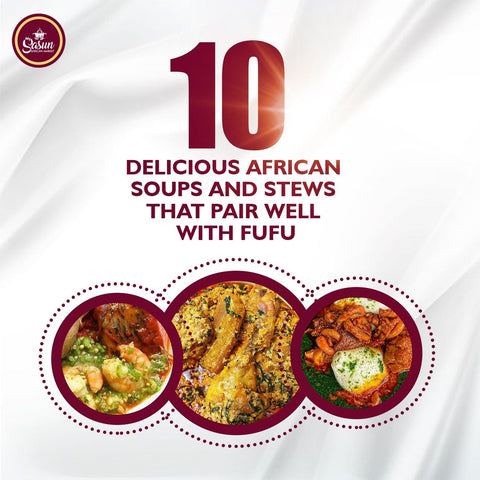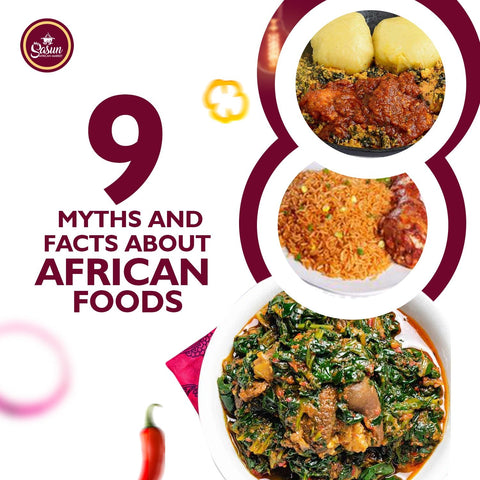Fufu is a beloved ‘swallow’ food in many African Households, made from starchy vegetables like cassava, yams, or plantains, and pounded into a smooth, dough-like consistency. This versatile dish is often paired with a variety of flavorful soups and stews, offering different taste experiences. In this article, we'll look at 15 different soups and stews from across the continent that go beautifully with fufu.

What is Fufu?
Fufu is a traditional African dish with a texture similar to mashed potatoes or dough. It's made by boiling starchy vegetables like cassava, yams, or plantains, then pounding them until smooth and elastic. The resulting dough is typically shaped into balls and served with soups or stews.
Origins of Fufu
Fufu originated in West Africa and has spread to various regions, each with its own variations and methods of preparation. It plays a significant role in the food traditions of countries like Nigeria, Ghana, and Cameroon.
Preparation Methods
The preparation of fufu involves boiling starchy vegetables until soft and then pounding them using a mortar and pestle. In modern kitchens, food processors or fufu machines can simplify this process.
Types of Fufu
Different regions use various base ingredients for fufu:
- Cassava Fufu: Common in Nigeria and Ghana.
- Yam Fufu: Popular in Nigeria.
- Plantain Fufu: Preferred in some parts of Ghana and other West African countries.
Check this blog for different types of fufu in Africa
Pairing Fufu with Soups and Stews
The neutral taste of fufu makes it the perfect companion for rich and flavorful soups and stews. The combination allows the fufu to absorb and complement the bold flavors of the accompanying dishes.
The smooth, doughy texture of fufu pairs well with the diverse textures of African soups and stews, creating a balanced and satisfying meal.
Fufu is traditionally eaten with the hands. A small piece is pinched off, molded into a ball, and then dipped into the soup or stew. This tactile method of eating enhances the dining experience.
Soups that Go well with Fufu
Egusi Soup
Egusi soup is a hearty and flavorful dish made with ground melon seeds, leafy vegetables, and various meats or fish. It's a popular choice in Nigeria and Ghana.
Get all your ingredients for making Egusi soup here

Ogbono Soup
Ogbono soup, also known as draw soup, is made with ground ogbono seeds, which give it a thick and slippery texture. It's often cooked with meat, fish, and vegetables.
Get all your ingredients for cooking ogbono soup here

Groundnut Soup
Groundnut soup, or peanut soup, is a creamy and rich stew made with ground peanuts, tomatoes, and spices. It's a staple in many West African countries.

Light Soup
Light soup is a spicy and aromatic broth made with tomatoes, onions, and peppers. It's commonly served with fish or meat and is a popular dish in Ghana.

Ndolé
Ndolé is a traditional Cameroonian stew made with bitter leaves, groundnuts, and meat or fish. It's known for its unique flavor and rich texture.

Mbongo Tchobi
Mbongo Tchobi is a black stew from Cameroon, made with a special blend of spices and often served with fish. Its dark color and intense flavor make it a distinctive dish.

Okra Soup
Okra soup is a popular dish in many Central African countries. It's made with fresh okra, tomatoes, onions, and meat or fish, resulting in a thick and viscous texture.

Sukuma Wiki
Sukuma Wiki is a nutritious and flavorful stew made with collard greens, tomatoes, and onions. It's a staple in Kenyan cuisine and pairs well with fufu.

Mchuzi Wa Samaki
Mchuzi Wa Samaki is a Tanzanian fish stew made with tomatoes, coconut milk, and spices. Its creamy and aromatic sauce is perfect for dipping fufu.
Okazi Soup
Okazi Soup, also known as Ukazi Soup, hails from the eastern part of Nigeria. It is made with dried and ground Ukazi leaves, giving the soup a slightly thickened texture. Typically enriched with ingredients like meat, fish, and palm oil, Okazi Soup is cherished for its rich taste.

Check here for 27 Delicious West African Soups
The Perfect Pair: Fufu and Egusi Soup
The Best Egusi Soup Recipe
Ingredients
- 2 cups ground egusi (melon seeds)
- 1 pound assorted meats (beef, goat, or chicken)
- 1 cup stockfish or dried fish
- 2 cups leafy greens (spinach or bitter leaves)
- 2 large tomatoes, chopped
- 1 large onion, chopped
- 2 tablespoons palm oil
- 1 tablespoon ground crayfish
- 1 teaspoon ground pepper
- Salt to taste

Preparation Steps
- Heat palm oil in a pot and sauté the onions until translucent.
- Add the tomatoes and cook until the oil begins to separate from the tomato mixture.
- Add the ground egusi and stir continuously to prevent burning.
- Introduce the assorted meats and stockfish, ensuring they are well-coated with the egusi mixture.
- Pour in enough water to cover the ingredients and bring to a boil.
- Reduce the heat and let simmer until the meat is tender.
- Add the leafy greens, ground crayfish, and pepper.
- Adjust seasoning with salt and let the soup simmer for an additional 10 minutes.
Cooking Tips
- For a richer flavor, use meat stock instead of water.
- Ensure continuous stirring to prevent the egusi from clumping.
How to Make Nutritious Okra Soup to Serve with Fufu
Ingredients
- 2 cups fresh okra, chopped
- 1 pound assorted meats (beef, goat, or chicken)
- 1 cup stockfish or dried fish
- 2 large tomatoes, chopped
- 1 large onion, chopped
- 2 tablespoons palm oil
- 1 tablespoon ground crayfish
- 1 teaspoon ground pepper
- Salt to taste

Preparation Steps
- Heat the palm oil in a pot and sauté the chopped onions until soft.
- Add the chopped tomatoes and cook until the oil separates from the tomato mixture.
- Introduce the chopped okra and stir well to combine.
- Add the assorted meats and stockfish, ensuring they are well-coated with the okra mixture.
- Pour in enough water to cover the ingredients and bring to a boil.
- Reduce the heat and let the soup simmer until the meat is tender.
- Season with ground crayfish, pepper, and salt.
- Simmer for an additional 10 minutes to allow the flavors to meld together.
Cooking Tips
- For a thicker consistency, chop the okra finely or blend a portion of it.
- Adjust the thickness of the soup by adding more or less water.
Health Benefits of Fufu and Soups
Fufu and its accompanying soups and stews are rich in essential nutrients, including carbohydrates, proteins, vitamins, and minerals. The combination provides a balanced meal that supports overall health.
- Energy Boost: Fufu is high in carbohydrates, providing a quick and sustained energy source.
- Protein-Rich: The soups and stews often contain meat, fish, or legumes, contributing to muscle growth and repair.
- Fiber Content: Ingredients like leafy greens, okra, and beans offer dietary fiber, aiding digestion and promoting gut health.
- Antioxidants: Tomatoes, onions, and various spices in the soups provide antioxidants that help combat oxidative stress and inflammation.
Tips for Making Perfect Fufu
- Consistent Pounding: Ensure a smooth texture by pounding the boiled starchy vegetables consistently.
- Right Temperature: Boil the vegetables until they are fully soft before pounding.
- Water Balance: Add water gradually while pounding to achieve the desired consistency.
Tips for making the Best Fufu from scratch
Ensure the vegetables are fully cooked before pounding to avoid a lumpy texture.
Maintain a steady rhythm while pounding to ensure uniform smoothness.
Consider using a food processor or fufu machine for a quicker and easier preparation process.
The more you make fufu, the better you'll get at achieving the perfect texture.
How to Serve Fufu with Soups and Stews
Serve fufu in small, smooth balls alongside a bowl of soup or stew. The presentation can enhance the dining experience and make the meal more appealing.
Other Accompaniments for the Soups
- Pepper Sauce: Add a spicy kick with a side of pepper sauce.
- Vegetables/Fresh Herbs: Include steamed or sautéed vegetables for added nutrition.
An Easier Method of Making Fufu
An Easier Method of Making Fufu
Modern Innovations
Making fufu from scratch can be a time-consuming and labor-intensive process. However, recent innovations have made it easier for anyone to enjoy this traditional dish with minimal effort. One of the most significant advancements is the availability of fufu flours, which simplify the preparation process without compromising on taste or texture. These flours are derived from various starchy vegetables and are widely available in grocery stores and online.
Types of Fufu Flours
- Yam Flour: Made from dried and ground yams, yam flour offers a convenient way to prepare yam fufu. It's quick to cook and has a similar taste and texture to traditionally pounded yam.
- Plantain Flour: Derived from dried and ground plantains, plantain flour provides a slightly sweet flavor and is a great alternative for those who enjoy plantain-based fufu.
- Cassava Flour: Made from dried cassava roots, cassava flour is a popular choice for making cassava fufu. It cooks quickly and produces a smooth, elastic dough.
- Garri: Garri is a granulated form of cassava that can be easily rehydrated with boiling water to make a quick version of fufu.
Easy Preparation Steps
- Boil Water: Start by bringing a pot of water to a boil.
- Add Flour: Gradually add the fufu flour of your choice to the boiling water, stirring continuously to prevent lumps.
- Stir and Cook: Reduce the heat and continue stirring until the mixture thickens and reaches the desired consistency. This usually takes about 5-10 minutes.
- Shape and Serve: Once the fufu is smooth and elastic, shape it into balls and serve with your favorite African soup or stew.
Where to Buy Fufu Flours
My Sasun African Market offers a wide variety of high-quality fufu flours, including yam flour, plantain flour, cassava flour, and garri. Our products are sourced fresh and are affordably priced. We deliver to all states in the US and Canada, ensuring that you can enjoy authentic African fufu no matter where you are.
Visit My Sasun African Market to explore our selection and place your order. Enjoy the convenience of making fufu at home with our premium flours and elevate your meals with the rich flavors of African Foods.
Frequently Asked Questions About Fufu and Soups
What is the best way to store leftover fufu?
Store leftover fufu in an airtight container in the refrigerator for up to three days. Reheat by steaming or microwaving until hot.
Can I freeze fufu?
Yes, fufu can be frozen. Wrap individual portions in plastic wrap and place them in a freezer-safe bag. Thaw in the refrigerator and reheat before serving.
What are some variations of fufu?
Variations of fufu include cassava fufu, yam fufu, and plantain fufu. Each type has a unique flavor and texture.
Can I make fufu with other starchy vegetables?
Yes, you can experiment with other starchy vegetables like sweet potatoes or taro to create different fufu variations.
How do I know when fufu is ready?
Fufu is ready when it reaches a smooth, elastic consistency without lumps. It should easily form into balls without sticking to your hands.
What soups and stews go well with fufu?
Popular soups and stews that go well with fufu include egusi soup, ogbono soup, groundnut soup, light soup, ndolé, mbongo tchobi, okra soup, sukuma wiki, mchuzi wa samaki, harira, chorba, chakalaka, and umngqusho.
Rounding Off…
Fufu, with its smooth texture and neutral flavor, is the perfect complement to a wide variety of rich and flavorful African soups and stews. Whether it is a hearty bowl of egusi soup or a spicy serving of chakalaka, the combination of fufu and these traditional dishes offers a delightful and satisfying eating experience.
Bring the authentic taste of home to your kitchen with My Sasun African Store. From fufu powders to ingredients for your favorite soups, we have everything you need to make delicious African meals with ease.
Shop online at MySasun.com or download the MySasun app to order your favorite ingredients and enjoy fast, convenient delivery right to your door.







Comments (4)
Am here to let the whole world know that I was diagnose of herpes 3 years ago where all hope was lost and I had nothing to do about it,I just accepted the faith that one day I will cure of this disease and I just pray everyday for a helper and one day my sister introduce me to a herbal doctor man called Dr ahonsie that she saw him on internet well I contact him on his email,I was not fully convinced until he sent me the herbal medicine which he ask me to take for two weeks I took it with faith and i went for a retest in different hospitals and today am cured of this disease and am also using this medium to let all those having STD,like herpes and the rest not to give up,their is a man who can cure you,his name is Dr ahonsie . contact the great herbalist via his Email: drahonsie00@gmail.com / WhatsApp: +2348039482367. https://drahonsie002.wixsite.com/dr-ahonsie
I thought the physicians says there is no cure for HSV 2!!! I am telling you today that Dr ahonsie cure HSV 2 with his herbal medicine and once you get cured you are cured forever it is never reversible, I have been suffering for this deadly disease called h HSV 2 for more than a 2years and lost all hope because my doctor says there is no cure for HSV 2. Brethren I saw a testimony on the internet on how Dr ahonsie cure HSV, Hapatitis etc with his herbal medication and an email and watsapp to contact him was also displayed, I thought this was joke but I decided to contact him and he replied telling me not to worry that my problem is over . Dr ahonsie sent me a herbal medication to drink for one month but only 2weeks I feel strange and I went to my doctor and he confirmed me negative. He can help you too. Contact him drahonsie00@gmail.com or whatsapp +2348039482367 https://drahonsie002.wixsite.com/dr-ahonsie https://www.facebook.com/drstellaherbalhome?mibextid=ZbWKwL
My purpose out here today is to share this article to the world about how Doctor Odunga helped me in getting back my EX-boyfriend who broke up with me 4 months ago. I tried all I could to make him see reasons with me so that we can continue our relationship but he denied me. Thank God for giving me the thought of going into the internet for help, I searched properly and I saw different reviews of Doctor Odunga and I insisted on giving it a try by contacting him via what’s app on (+2348167159012). He gave me reason to live again and he prepared a spell and told me that my Ex-boyfriend will come back to me within 11 hours. Can you believe it, my EX-boyfriend came back to me, proposed to me and our wedding will be held soon. Contact him now!!! if you need any help. Email: odungaspelltemple@gmail.com and he does a lot of spells. Once again i want to say am very grateful for your help
Am really grateful and thankful for what Dr Ahonsie has done for me and my family. I Was having HERPES for good three years with no solution, the diseases almost took my life and because I was unable to work and I was also loosing lots of money .for medication, but one faithful day when I went online, I met lots of testimonies about this great man so I decided to give it a try and to God be the glory he did it. he cured me of my diseases and am so happy and so pleased to Write about him today. if you need his help or you also want to get cured just the way I got mine, just email him below drahonsie002@gmail.com You can also call or whatsApp his telephone number on +2348039482367. https://drahonsie002.wixsite.com/dr-ahonsie https://www.facebook.com/drstellaherbalhome?mibextid=ZbWKwLThanks once again Dr Ahonsie.